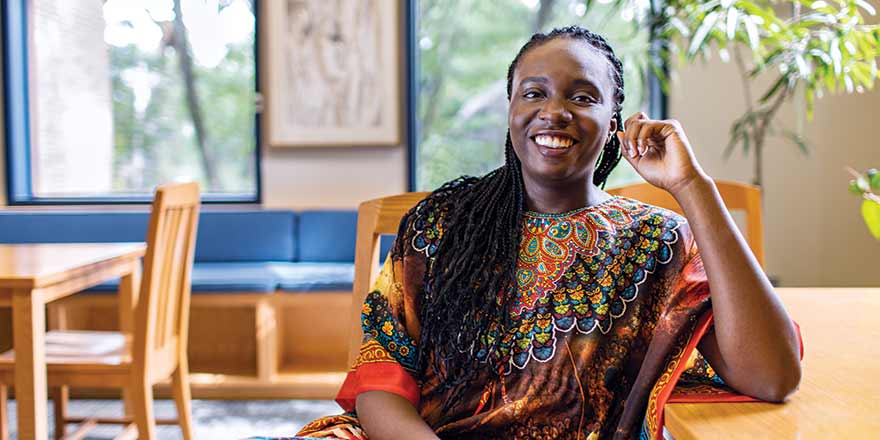
Bele Edeoga’s interest in the relationship between colonialism and economics took her halfway around the world to study abroad in Shanghai and her course schedule through seemingly half the departments at Sarah Lawrence. She has studied international relations, taken two languages, dabbled in Classics, and even took a podcasting course her senior year—each discipline allowing her to tackle her interests from a new angle.
Bele analyzed colonialism in several geographic contexts, finding connective threads particularly between Latin America and Africa as early as her First-Year Studies course, “The Problem of Empire: A History of Latin America” with Margarita Fajardo.
“We looked at the impact and legacy of colonialism in Latin America,” Bele said. “My conference work looked at the history of Cuba pre-colonialism and then, present day, looked at its policy with Afrocubanos.”
Bele gravitated toward research papers, building on previous conference work and making interdisciplinary connections.
“My independent study senior year was on the relationship between the Chinese government and the entertainment industry, looking particularly at censorship,” Bele said. “I had looked at the topic when I studied abroad in Shanghai, but from a different focus—then I was looking at censorship around religion.”
During a macroeconomics class her junior year, Bele created a business plan modeled on the makeup industry, connecting external economic and legislative factors—like minimum wage laws and tax rates—to her company’s decision making.
“I was basically doing a five-year projected plan for the company,” she said. “It was really interesting, because I was able to research the various regulations and laws for the makeup industry.”
Bele has found that the research process is often as valuable as the research itself, and she isn’t afraid to learn from missteps.
“Sometimes you realize, yes, you formed the wrong opinion; and that is a bit of a letdown, but it’s still rewarding,” Bele said. “I did work on China’s impact in Africa—I wanted to do it initially on Nigeria, because that’s where I’m from; but there wasn’t enough literature, so I had to find another angle.”
Never afraid to seek help or make mistakes, Bele is confident she’s ready to take her academics into the real world.
“I think the core of what SLC teaches is being independent, being able to talk about your opinions and form an opinion, and having enough sources to cite and back up your opinions.”
Pronouns She/her
Pictured in The Living Room of the Barbara Walters Campus Center / photo by Don Hamerman
Sometimes you realize, yes, you formed the wrong opinion; and that is a bit of a letdown, but it’s still rewarding.